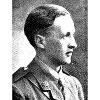Watson, Mark Sanderson (1895 - 1917)

Buried at Basra Memorial
Commemorated at Hillhead High School
Mark Watson, eldest son of the Rev. Richard Watson, Headingley, Leeds, and formerly minister of St. John's Wesleyan Church, Sauchiehall Street, Glasgow, was a pupil of the School from 1906 until 1911. There he is still remembered for his radiant personality, his high gifts, and the glowing promise of his future.
After a year at the Morgan Academy, Dundee, where he gained many distinctions, including a Ferguson Bursary and the Gold Medal for English, he returned to Glasgow for his University course. He graduated M.A. in June, 1915, and was accepted shortly after as a candidate for the ministry of the Wesleyan Church. But instead of entering the Theological Hall he accepted a commission, and went out to fight in what was to him both the cause of his country and a great ethical conflict.
On his twenty-first birthday, 15th May, 1916, he left home for Mesopotamia, where he was attached to the 1st H.L.I. On the 11th of January, 1917, he fell while leading his men against the Turkish positions on the right bank of the Tigris, near Kut. Notable testimonies to his character, gallantry, and unselfishness have been received from his lieutenant-colonel, chaplain, brother officers, and men of the regiment.
Mark Watson was a man of outstandingly vivid and lovable personality, possessed of a strength and resolution older than his years, together with the enthusiasm and gaiety of heart of a boy. One remembers him as an eager and hard-working forward upon the football field (he gained his School cap in 1911); as a witty and arresting speaker in the Literary Society; as a student whose thinking was broad and original, and essentially honest; and, when need arose, as a keen and efficient soldier.
But many remember him above all as a friend; for no man could wish for a better friend than Mark Watson. He shared wholeheartedly
in their life, bringing to each a nature full of sympathy and humour, strength of heart, and a splendid purity that was far too sunny and unconscious ever to seem reproachful or aloof. It was natural to be at one's best when with him; it was natural to share joys with him, and to turn to him in difficulties.
This is the man we have lost, and the country has lost. But we know that the sacrifice was no useless one; we know, too, that the qualities which made us love and honour him, and which are now taken from our knowing, are not lost.
And beyond our sorrow we are proud that it has been given to us, if only for a brief space, to have him among us .




